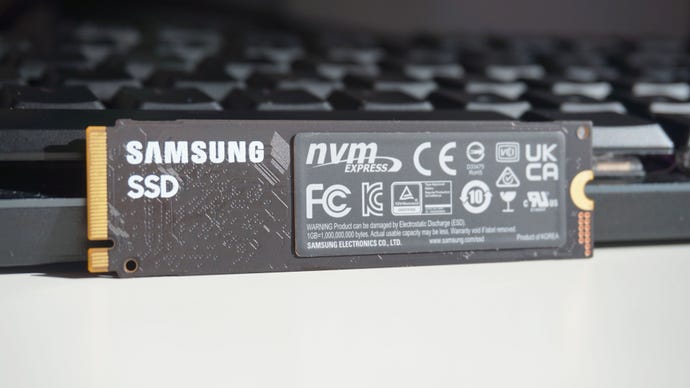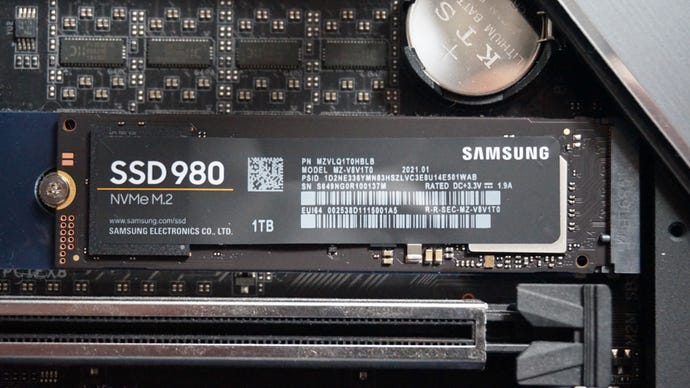Samsung 980 SSD review
Bringing the fight to WD's Blue SN550
Having recently kickstarted the race toward the best PCIe 4.0 SSD with the launch of their super fast 980 Pro, Samsung are finally expanding the rest of their 980 NVMe family. Much to my surprise, though, this isn't the long-awaited 980 Evo. Instead, Samsung appear to be diverging from their traditional Evo / Pro series with this latest NVMe drive, simply calling it the Samsung SSD 980. It's also a PCIe 3.0 drive, too, not the budget-friendly PCIe 4.0 you might have been expecting, so those looking for a cheaper way to get the latest and greatest of what SSDs have to offer might be disappointed. It is, however, quite a bit cheaper than previous Samsung drives, with UK pricing coming in much closer to my current favourite NVMe SSD, the stupidly good value WD Blue SN550 - and that alone is reason enough to be excited.
Available in 250GB, 500GB and 1TB capacities, the Samsung 980 has a rated sequential speed of up to 3500MB/s read and 3000MB/s write. On paper, this is actually a fraction slower than Samsung's 970 Evo Plus, which was rated for 3500MB/s read and 3300MB/s write, but Samsung say they've made great strides in making the 980 SSD a lot more power efficient this time round. By their figures, the 980 SSD provides 54% better performance per watt than the original 970 Evo, and its improved thermal design allows it to carry on operating at high speeds for longer compared to its predecessor.
Indeed, when I ran the 980 SSD through AS SSD's 1GB sequential benchmark, it came back with an impressive score of 2991MB/s read and 2361MB/s write, the former beating the 970 Evo's 2780MB/s and 970 Evo Plus' 2082MB/s read results by 7% and a whopping 43% respectively. Its write time, meanwhile, was pretty much identical to the 970 Evo, and just 15% slower than the 970 Evo Plus. Not bad considering its lower price.

Crucially, the 980 SSD's sequential speeds are quite a bit faster than the WD Blue SN550's respective ratings of 2400MB/s read and 1950MB/s write. In the same test, the SN550 came in with results of 2205MB/s read and 1929MB/s write, putting it 26% and 18% behind the 980 SSD.
In theory, at least. As I've said before, an SSD's sequential speeds aren't an accurate reflection of what you'll see in everyday use, as drives tend to read and write data randomly all over the shop rather than in neat, sequential blocks. As such, an SSD's random read and write speeds are much more in line with what you'll see day to day, and here the Samsung 980 and WD Blue SN550 are at a bit of a stalemate, with one doing better at reading and the other better at writing.
The 980 SSD comes out on top for random read speed, as it finished AS SSD's 1GB 4K random test with a score of 51.8MB/s, putting it 16% ahead of the WD Blue SN550's score of 44.6MB/s (and just 5% behind the 970 Evo and 970 Evo Plus' results of 55MB/s). The SN550, however, had the faster write speed, finishing the test with 157.3MB/s over the Samsung 980 SSD's result of 121.0MB/s. That's 30% faster than the 980 SSD, not to mention 19% faster than the 970 Evo Plus' score of 132.2MB/s, and only 7% slower than the original 970 Evo's 169.9MB/s result.

This is why the SN550 continues to be such a great value SSD, as its everyday performance can go pretty much toe to toe with its more expensive competition. On this basis, I'd probably still err toward the WD Blue SN550 as being the better value drive overall, especially as its prices are currently just a smidge cheaper by virtue of it having been out for a bit longer.
The Samsung 980 SSD's game loading times aren't any faster than the WD Blue SN550, either. Both drives loaded into Monster Hunter: World's main Astera hub in around nine seconds, and both took around 18 seconds to load into Final Fantasy XV's lush Duscae region. They also took an identical 11 seconds to load into Shadow Of The Tomb Raider's Cozumel village. The only place the two drives diverged was Shadow Of The Tomb Raider's Hidden City, which took 19 seconds to load on the 980 SSD and 13 seconds on the SN550. In the grand scheme of things, though, you're looking at pretty much identical performance here.
However, the Samsung 980 SSD does have one important ace up its sleeve: its transfer speeds. When I timed how long it took to move my 98GB Assassin's Creed Odyssey folder from my old WD Black 3D NVMe SSD to each of these two drives, for example, the Samsung 980 SSD finished in just a minute and seven seconds, hitting a top speed of a whopping 1.73GB/s and rarely falling below 1GB/s. The WD Blue SN550, on the other hand, took two minutes and 43 seconds, peaking at just 670MB/s with lows of around 520MB/s. That's an outstanding result from the 980 SSD, and a major advantage for those who regularly move large files around their PC, or simply just want to rearrange the location of their Steam library every now and again.

Indeed, if the 1TB Blue SN550 still cost £125 like it did at launch, then the £120 Samsung 980 SSS would be the clear winner here, even despite its slower random write results. After all, you're still getting the same quick loading times, the same five year warranty, the same 150TBW (terabytes written), 300TBW and 600TBW endurance ratings across all three size capacities, as well as superior random read speeds and those blisteringly fast transfer speeds.
However, when the 1TB SN550 can currently be had for £105 (and has frequently been known to drop as low as £90-95 on occasion), it's still a highly tempting proposition for those looking to spend as little as possible on a top notch NVMe drive. The 250GB and 500GB models of the SN550 are also cheaper than the Samsung 980 SSD right now, too, coming in at just £39 / £52 as opposed to £46 / £65. These prices will no doubt fall in time, though, and when they do, that's when things are going to get really interesting. Samsung's 980 SSD definitely has what it takes to compete with the SN550, but unless you're 100% sold on those faster transfer speeds, I reckon the 980 SSD is just a tad too expensive right now to completely dethrone its WD rival.

